#yaël braun-pivet
Explore tagged Tumblr posts
Text
Quand on vous dit que la NUPES fait rien qu'à bordéliser les débats, hein !
Il n'est peut-être pas inutile de rappeler que Mme Yaël Braun-Pivet ne doit en rien son poste de ~première femme présidente de l'Assemblée nationale~ à ses compétences mais bien à un service rendu au Présiroi d'avoir enterré l'affaire Benalla en 2018.
Pour qui n'a pas pour habitude de suivre les débats au Parlement, je vous assure que c'est édifiant, et donne la pleine mesure du degré réel de la démocratie représentative en France.
#accessoirement ça développera votre créativité quand vous vous serez mis au vaudou pour confectionner des poupées de tout le gouvernement#et oui tout le monde commence par cette petite saloperie de gabriel attal#politique française#assemblée nationale#yaël braun-pivet#sandra regol#gabriel attal#une question d'importance#réforme des retraites#une casserole en pleine poire tiens
6 notes
·
View notes
Text
Ramos-Horta husu Fransa Apoia Timor-Leste
Hatutan.com, (27 Janeiru 2024), Paris- Prezidente Repúblika (PR), José Ramos-Horta, husu Prezidente Asembleia Nasionál Repúblika Fransa (PANRF), Yaël Braun-Pivet, kontinua apoiu bá kooperasaun bilaterál Timor-Leste ho Fransa no halais prosesu instalasaun embaixada Fransa iha Timor-Leste. Continue reading Ramos-Horta husu Fransa Apoia Timor-Leste

View On WordPress
#José Ramos-Horta#Prezidente Asembleia Nasionál Repúblika Fransa (PANRF)#Prezidente Repúblika (PR)#Yaël Braun-Pivet
0 notes
Text
Eux qui mettent leurs enfants en non mixité à Stanislas
Plus on avance dans le temps plus elle devient ridicule. Quelle famille
3 notes
·
View notes
Text
Yaël Braun-Pivet, President of the National Assembly, denounces the "unacceptable or inappropriate behavior" of certain deputies
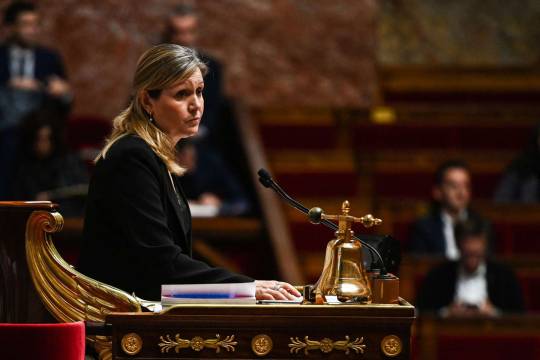
“Typically lamentable spectacle”, “worrying degradation” debates… In a letter addressed to all the deputies, Friday April 7, the president of the National Meeting, Yaël Braun-Pivet, castigates “critical dysfunctions” in the habits of Members and asks them to respect the guidelines of the Hemicycle. “The primary months of the 16e legislature have clearly been marked by critical particular person or collective dysfunctions in the functioning of our working our bodies and by a worrying deterioration in the serenity and high quality of our exchanges”considers the holder of the perch, from the Renaissance group. THE "unhappy document" penalties for “unacceptable or inappropriate habits” should “difficult us all”in addition to "invective" and the “hectic classes”she provides.
Prohibitions on holding indicators or making phone calls
The President of the Meeting remembers a collection of guidelines, similar to the ban on brandishing "indicators" in the hemicycle, whereas a number of dozen left-wing deputies, largely "rebellious", have been referred to as to order on Wednesday by the workplace of the Meeting for having brandished indicators “64 years previous isn't any” singing The Marseillaise March 16, the day of the triggering of 49.3 to have the pension reform adopted. Whereas the Prime Minister, Elisabeth Borne, triggers article 49.3 of the Structure at the podium, the deputies of LFI brandish indicators “Democracy” or “64 years previous isn't any! and sing "La Marseillaise", at the National Meeting, in Paris, on March 16, 2023. JULIEN MUGUET FOR “THE WORLD” Yaël Braun-Pivet additionally emphasizes the “prescription prohibiting phone calls inside the hemicycle” or make use of "any communication software with the exterior"in an allusion to “lives” of the deputy Ugo Bernalicis (La France insoumise, LFI) on the social community Twitch, or to the tie microphones worn in session by deputies from completely different sides, together with the elected Aurélien Pradié (Les Républicains), for the functions of a report from France 2. The President of the Meeting additionally introduced that she had entrusted a mission to Vice-President Naïma Moutchou, additionally answerable for the communication and press delegation, with a view to "to take inventory" on "filming authorizations and guidelines for taking pictures and sound" in the Meeting, but additionally “on the use made by MPs of varied communication instruments”.
"We're not children to be punished", castigates the left
Amongst the questions, the right way to protect the use of closed doorways for joint joint committees (CMP), these our bodies the place deputies and senators meet to attempt to discover a compromise on a proposal or a invoice. Throughout the CMP on pensions, elected officers from Nupes claimed to promote the debates on social networks, for extra transparency, scary the ire of elected officers from different camps. Learn additionally: Article reserved for our subscribers Insubordinate France returns to conflictuality, a method with combined outcomes This latest name to order inflicted on dozens of deputies has sparked a collection of protests on the left. “We're not children to be punished, however deputies who oppose us to your pension reform. No name to order will silence or scare us”castigated the ecologist Sandrine Rousseau on Twitterafter receiving one for tweeting at CMP. The chief of the "rebellious", Mathilde Panot, for her half introduced in a tweet and a post problem these calls to order issued towards the elected representatives of his group earlier than the Council of State, and " if needed "earlier than "European Court docket of Human Rights". "These sanctions taken towards opposition MPs exhibit that, removed from imposing the prerogatives of the legislative energy, you're not more than an executor of the base works of the govt in its authoritarian flip"she asserts towards Mme Braun-Pivet in the similar mail. Different sanctions have been issued towards MPs since the begin of the new legislature final June. In November, for instance, the deputy Grégoire de Fournas (National Rally) had been sanctioned with a fifteen-day exclusion from the hemicycle, after having made racist remarks towards the deputy Carlos Martens Bilongo (LFI). Decryption: Article reserved for our subscribers How the pension reform has put the French political world in turmoil The World with AFP Source link Read the full article
#assembly#behavior”#braun-pivet#certain#denounces#deputies#inappropriate#national#politics#president#the#unacceptable#yaël
1 note
·
View note
Link
0 notes
Text
The far right’s historically high score in the first round of the French legislative elections was reflected in the alarmed headlines of major international media outlets. An “earthquake”, a “staggering collapse” authored by Emmanuel Macron’s “arrogance and disdain for his fellow citizens” were among the reactions. But despite the imminence of the potential catastrophe now facing France – the far right has never been as close to power since the collaborationist Vichy regime – many in the political centre still struggle with the idea of uniting to keep National Rally (RN) out.
Macron irresponsibly conflated the far right and the left during the campaign, claiming that the “two extremes” (right and left) would lead to “civil war”. His rhetoric falsely equated the hateful far right with a coalition of parties on the left (the New Popular Front, NFP) that aspires to equality and social justice. He even adopted the talking points of the far right to attack the left’s “immigrationist” programme.
Macron eventually called for a “broad democratic and republican coalition” in the second round to unite to block “the imminent danger of an absolute majority for the RN”. But it took time for even heavyweights in his party to heed him. Many have refused to withdraw, selfishly risking the election of RN candidates to parliament.
For Yaël Braun-Pivet, president of the national assembly, blocking the RN was not enough of a reason to vote for France Unbowed (LFI), the leading party on the left. Finance minister Bruno Le Maire agreed, opposing the RN unless it meant voting for LFI.
The messaging from Macron’s Ensemble coalition has been mixed: the party announced that candidates would tactically withdraw from constituency races “in favour of candidates capable of defeating the National Rally and with whom we share the values of the Republic”. The statement’s ambiguity, apparently aimed at LFI, left the definition of republican values open to interpretation.
Over the past two years, LFI has faced constant criticism. The party’s clear stance against Islamophobia, in a context where hostility towards Muslims in France is normalised, is often maliciously characterised as a shameless bid to attract Muslim votes. Recently, accusations of antisemitism have intensified due to LFI’s strong support for protecting Palestinian lives in Gaza; the nomination of Rima Hassan, a French-Palestinian refugee, for the European elections; and some members’ refusal to label Hamas a terrorist group.
Like any form of racism, antisemitism is historically and structurally ingrained in France. It has found expression far too often (as have Islamophobia, sexism and transphobia) and LFI must continue to address and combat the antisemitism that persists within its ranks.
But the exclusionof an entire segment of the population is not part of LFI’s programme. According to a new report by the National Consultative Commission on Human Rights, “the majority of antisemitism is manifested among citizens on the right or far right”.
LFI, led by Jean-Luc Mélenchon, a staunch critic of Macron, issued a clear directive ahead of the second round: “Nowhere will we allow the RN to prevail. Our stance is unequivocal: no votes, no seats for the RN.” LFI candidates withdrew from races where the RN posed a threat, including against Gérald Darmanin, the rightwing interior minister, who by contrast said he would abstain rather than give LFI his vote in a two-way contest with the RN.
Gabriel Attal, the prime minister, eventually came out with an explicit call on voters to block the RN even if that meant voting for LFI. While many candidates in Macron’s camp have withdrawn from races featuring LFI candidates, some have refused to do so, even at the risk of letting the RN win.
Yet every day brings new examples of the horror the country is plunging into and which an RN victory would exacerbate. Since the dissolution of parliament on 9 June, there has been an increase in racist and homophobic incidents. A Black woman insulted on camera by her white neighbours said the election had opened the floodgates to a climate of intolerance towards people of migrant heritage. A motorist who said he was an RN voter is alleged to have racially insulted and hit a school bus driver after a parking dispute in Val-de-Marne. Racist leaflets demanding that authorities “stop the Blacks” were distributed to residents of a small town in the Yvelines region of northern France. A bakery in Avignon that had hired a Black employee was targeted in an arson attack and daubed with racist graffiti. In Calais, there has been a spate of violent incidents against migrants. I could go on.
This is a foretaste of the kind of atmosphere the National Rally would make mainstream. According to the National Consultative Commission on Human Rights, the normalisation of racism is rising alongside support for the far right. That is hardly surprising when you consider that Mediapart and Libération have investigated RN candidates and have not had to dig far to find examples of the crudest forms of racism – including antiziganism, antisemitism and Islamophobia, sexism, homophobia, conspiracy theories and Nazi nostalgia – fuelling their social media feeds.
Marine Le Pen has managed to rebrand her party, but maintains strong ties with groups and builds allyship with European parties that are less cautious about hiding their extremism. She tries to distance herself from the legacy of the party co-founded by her father, Jean-Marie Le Pen, with former Nazi collaborationists. He has long been accused of torturing civilians while serving as a paratrooper during the Algerian revolution and was convicted on charges of minimising the Holocaust.
But Le Pen’s party not only pursues a hardline anti-immigrant policy. It aims to create different categories of French nationals, stripping dual citizens of rights.
This is what the RN represents at its core and why it must be prevented from prevailing next Sunday. Stopping the far right takes courage and moral clarity: politicians need to put their individual interests aside in the interest of everyone. We cannot waver on our principles, and risk pushing France into a situation from which it will not recover. For those who are privileged, failing to do everything in their power to block the RN may seem acceptable. But they need to think about those millions whose lives are at risk.
“We’ll argue later” has become the motto of the leftwing parties that have coalesced against the far right. This should be applicable to everyone across the political spectrum who is capable of defeating the far right. The priority must be to make sure this party never crosses the threshold of power.
19 notes
·
View notes
Text

Emmanuel Macron annonçant la dissolution de l'Assemblée nationale à Yaël Braun-Pivet (Présidente de l'assemblée), Gabriel Attal (Premier ministre) et Gérald Darmanin (Ministre de l'intérieur).
Source: Soazig de la Moissonnière, photographe officielle de l'Elysée
13 notes
·
View notes
Text

Yaël Braun-Pivet : Chui prête à tailler une pipe à Eric Ciotti pour garder mon poste de présidente de l'assemblée"
( source X @ToussMichelle)
7 notes
·
View notes
Text
French Politics Update
Since the 2024 French elections earlier this year, we left off with a more balanced National Assembly. Left-wing politicians became the highest population at 188 seats with centrist Emmanuel Macron still the president. The centrist party is not far behind with 161 seats and the right-wing party with 142.
Many networks at the time discussed the expectation of a hung parliament, as no one party holds the 289-seat majority.
Some things stay the same. In July, the National Assembly voted to keep centrist party member Yaël Braun-Pivet as speaker, winning by 13 votes. Additionally, many people have called for Macron to step down as President, but he will likely stay for the rest of his term until 2027.
New PM
On the other hand, there have been major changes. Prime Minister Gabriel Attal resigned in July, and was replaced by Michel Barnier in September. He is a conservative, the leader of the 2016-2019 Brexit negotiation, and his appointment was met with much criticism from the left-wing parties.
Days after his appointment, over 100,000 people participated in protests across France. Many people view President Macron’s PM choice as disruptive to democracy, as the PM is most often chosen from the dominant National Assembly party.
Macron states that he made this choice based on the belief that Barnier seemed the most capable of dealing with political deadlocks, as is expected of the Parliament with no party holding majority.
I have to wonder, though, if this was also out of spite for the left-wing parties winning more seats than his centrist party. Barnier’s politics are expected to rely on joint support from the centrist and conservative parties. If the right or center opposes him on anything, he almost certainly will face loss after loss with his proposed policies. Will this lead France backward after the left finally gained some political power?
Barnier’s Address
Barnier delivered his first parliamentary address on Tuesday, October 1st. Summarily, he emphasized the hazard of French finances and debts, and the environment.
France is more than 3 trillion euros in public and environmental debt, which Barnier addresses first. His goal is to bring the deficit down from 6% of the national GDP to 5% in 2025, with the goal of under 3% by 2029.
His outline for achieving this is reducing spending, being more efficient in government spending (addressing corruption and unjustified spending), and taxes. He phrases higher taxes as a temporary measure, and states that large companies as well as the richest and wealthiest French people will be asked for exceptional contributions.
Barnier also addresses environmental debt. He plans to continue reducing GHG emissions, and for France to be more active in the EU and in the Paris Agreements, which push for countries to collectively act against climate change. He also mentions encouraging industry transitions in energy and recycling, encouraging nuclear energy development, and developing renewable resources of energy more, like biofuels and solar energy.
He has also conceived of a large national conference to act on the matter of water, the scarcity of which is an imminent issue for France.
Additionally, he plans to propose a yearly day of citizens consultations. In his idea, doors will be open for citizens for people of all levels of government to ask questions and start discussions and debates on various topics.
Another noteworthy statement from Barnier is that the pension reform bill voted on in 2023 might have to be changed, which received a loud reply from the audience.
As someone living in a country where an entire political party is built on denying factual evidence and realities, it is surprising to hear someone who does not deny climate change, and calls for equitable taxes to address debt.
About 30 minutes into his address, though, New Caledonia comes up. This is more in line with expectations of conservatives. New Caledonia is still a colonized territory of France, and a recent bill from Macron was going to disadvantage native Kanak people for the advancement of French loyalists on the archipelago. After fatal protests, the bill has been suspended before ratification, likely to be readdressed in 2025.
Also in conservative spirit, Barnier calls for stricter immigration policies in effort to meet “integration objectives”. France faces a cost-of-living crisis and an affordable housing shortage that has buttressed the right’s stance on needing stricter border measures.
Le Pen Trial
Also straining politics, especially for right-wing support, is recent news about popular right-wing figure Marine Le Pen.
On September 30th, Le Pen faced charges of embezzling European Parliament money. The right-wing party Rassemblement National is accused of filing false employee records in order to improperly use funds to pay members of the party. Le Pen is one of many senior party members involved in the alleged embezzlement.
This trial is expected to go on for seven to nine weeks, so the final outcome is some time away. But for now we can expect this will have negative impacts if Le Pen still vies for presidential election in 2027. It will likely also decrease citizen’s trust in the conservative party’s ability to make responsible economic decisions.
If found guilty, Le Pen and the other defendants could face up to ten years in prison and lose the eligibility to run for office.
After the 2024 shock vote instigated by President Macron, the French National assembly gained a left-leaning majority, though not enough for an automatic 289-vote majority. In most cases, this would mean a left-wing Prime Minister as well as a left-wing president, though that’s because the presidential vote is usually shortly after that of the national assembly.
Contrarily, Macron went with a conservative candidate that he believed to be stronger for the job. This increases the political unrest in the country, and increases the likelihood of delays and blockages in legislation development.
While the conservative Prime Minister has stated many intentions that people in the U.S.A. might call left-leaning, regarding climate change and tax targets, his appointment has upset many. His views on immigration, especially, contrast with most left-wing groups who want integration and safety for others. Overall, this decision from Macron calls into question his loyalty and dedication to the wants of the French people.
Additional Resources
1. New Prime Minister
2. Barnier on Borrowed Time
3. Le Pen on Trial
4. Barnier Address
5. Barnier Address Summary
#france#french politics#prime minister#emmanuel macron#french election#article#research#resources#environment#climate change#news#renewable energy#long post#yeah I look into France because I studied French and it's interesting#but it is indeed a colonial power that still enforces rule over other people#Michel Barnier#marine le pen#Going to look into actual crime statistics and immigration next#since that's all misinformation in the states
3 notes
·
View notes
Text
France's interior minister has banned all pro-Palestinian demonstrations in the country.
In a statement, Gérald Darmanin ordered foreign nationals who break the rules to be "systematically" deported.
The move comes as European governments fear a rise in antisemitism triggered by the Israel-Hamas war.
On Thursday, German police broke up a pro-Palestinian demonstration in Berlin.
France has a Jewish community of almost 500,000, the biggest in Europe. France's Muslim community is also among Europe's largest - an estimated five million.
Mr Darmanin told regional prefects that Jewish schools and synagogues should be protected by a visible police presence.
He earlier told French radio that 100 antisemitic acts had been recorded since Saturday. Most involved graffiti showing "swastikas, 'death to Jews,' calls to intifadas against Israel". However, some incidents included people being arrested attempting to carry knives into schools and synagogues, he added.
French police are already guarding the homes of leading MPs. National Assembly President Yaël Braun-Pivet and MP Meyer Habib have been offered further protection.
In a separate move, Germany's Chancellor Olaf Scholz declared "zero tolerance" for antisemitism.
He told parliament a pro-Palestinian group that had celebrated the murders of Israeli civilians on Saturday would be banned.
Berlin police have also banned planned pro-Palestinian demonstrations, citing the risk of antisemitic statements and glorification of violence. Authorities said around 60 demonstrators complied with an order to leave Berlin's Potsdamer Platz on Thursday.
French President Emmanuel Macron was due to give a TV address on Wednesday in a bid to prevent the war from escalating tensions.
Twelve French citizens are known to have died in the Hamas attack and Mr Macron told party leaders that of the 17 others missing, four were children.
It has also emerged that Assembly President Braun-Pivet has received death threats.
A member of President Emmanuel Macron's Renaissance party, she had parliament lit this week in the colours of the Israeli flag in response to the Hamas attack on Israel and called a minute's silence before an Assembly session on Tuesday.
Ms Braun-Pivet also announced that Maryam Abu Daqqa, a member of the Popular Front for the Liberation of Palestine (PFLP), would be banned from attending a documentary screening in parliament next month. The militant organisation is recognised as a terrorist organisation by the EU.
Meyer Habib has also been given protection. He represents a constituency for overseas French citizens which includes Israel and the Palestinian Territories and is a vocal supporter of Israel. After the Hamas attack he said "we are witnessing the return of pogroms".
French politics has been riven by the Hamas attack and its aftermath.
While most parties have condemned Saturday's "terrorist attack" and expressed support for Israel's right to respond, the initial response from Jean-Luc Mélenchon's far-left La France Insoumise (France Unbowed) party was more equivocal.
A statement by the party referred to the Hamas attack as "an armed offensive of Palestinian forces", prompting fierce criticism from other parties, including left-wing allies such as the Socialist and Communist parties.
In Germany, Chancellor Scholz told MPs in the Bundestag that Israel's security was German state policy. German Foreign Minister Annalena Baerbock is due to travel to Israel on Friday in a gesture of solidarity.
Mr Scholz also announced that pro-Palestinian group Samidoun, which was pictured handing out sweets in the Neukölln area of Berlin to celebrate the Hamas attack, would be banned. "We do not tolerate antisemitism," he added.
According to German authorities, in several towns across the country including Mainz, Braunschweig and Heilbronn, Israeli flags raised in solidarity with the country were torn down and destroyed, sometimes in just a few hours.
"The act disrespects and mocks the victims" of Hamas's attack, Braunschweig's mayor, Thorsten Kornblum, said.
Mr Scholz added that "without Iranian support, Hamas would not have been able to carry out these unprecedented attacks".
16 notes
·
View notes
Text

« Aujourd’hui, en 2024, c’est la même trahison des modérés. C’est Edouard Philippe qui appelle à voter pour un communiste ; Xavier Bertrand qui insulte les élus ou candidats RN, leur préférant l’extrême-gauche ; Gérard Larcher ou Bruno Retailleau qui refusent de prendre parti entre un RN et un LFI, tout comme Christian Estrosi ou Renaud Muselier, faisant au final le jeu des plus révolutionnaires. C’est toute la clique LR canal historique qui a exclu de faire reporter les voix de ses électeurs du premier tour sur les candidats nationaux, faisant élire l’extrême-gauche islamiste et antisémite, sans parler des bataillons des macronistes à l’image de Yaël Braun-Pivet qui s’est faite insulter pendant deux ans par les LFI, mais qui n’a pas pris position pour le RN en cas de duel entre eux. Alain de Benoist a très justement souligné dans un entretien pour Monde et Vie, que ce bal des hypocrites était favorisé par un système politique qui préférait « la coalition des perdants » aux vainqueurs du 1er tour. »
Michel Festivi in « Nouveau Présent »
5 notes
·
View notes
Text
Exclu pour un drapeau palestinien : le règlement insolite de l’Assemblée Nationale
-------------
Ce 28 mai : les hurlements stridents de Yaël Braun-Pivet, présidente macroniste du Parlement, qui résonnent dans l’Assemblée, pour un drapeau.
-------------
Alors qu’il était question, lors de débats parlementaires, des ventes d’armes de la France à Israël, pays mis en cause par la justice internationale dans le cadre d’une procédure pour génocide, le député Insoumis Sébastien Delogu a brandi un drapeau palestinien. Ce qui a mis hors d’elle la présidente, qui avait affiché son «soutien inconditionnel»…
Excluded for a Palestinian flag: the unusual regulation of the National Assembly
-------------
This May 28: the shrill screams of Yaël Braun-Pivet, Macronist president of Parliament, which resonate in the Assembly, for a flag.
-------------
While it was a question, during parliamentary debates, of arms sales from France to Israel, a country implicated by international justice in the context of proceedings for genocide, the Insoumis deputy Sébastien Delogu brandished a flag Palestinian. Which infuriated the president, who had displayed her “unconditional support”…
#may 28#may 28th#2024#israel is committing genocide#israel is a genocidal state#israel#israhell#france#paris hilton#paris france#paris fashion week#parislife#paris#palestine#free palestine#freepalastine🇵🇸#emmanuel macron#president macron#macron#gaza genocide#palestinian genocide#stop the genocide#genocide joe#genocide#no pride in genocide#ausgov#politas#auspol#tasgov#taspol
4 notes
·
View notes
Text
Retour de la IVe république
L’un des moments les plus symboliquement significatifs de ces derniers jours aura vu l’union de la gauche autour de la candidature du stalinien Chassaigne à la présidence de l’Assemblée nationale. Obtenant 207 voix au 3e tour contre 220 à la sortante Yaël Braun-Pivet, réélue de justesse. Cette séquence Chassaigne mériterait de marquer les esprits. Notons d’abord que les quatre groupes de gauche…

View On WordPress
2 notes
·
View notes
Text
Je sais pas si c'est controversé mais je ne trouve pas que le tweet de Mélenchon sur Yaël Braun-Pivet soit antisémite. Enfin, il ne l'est pas en lui-même, hors contexte de qui le dit.
PAR CONTRE, Mélenchon paye pour tous ses propos véritablement antisémites passés, ce qui me rend suspicieuse de tout ce qu'il peut dire sur le sujet. Sa défense n'est pas crédible parce que non ! Ce tweet n'est pas antisémite mais oui ! Il a déjà tenu des propos antisémites ! Et la gauche paye de son laxisme vis-à-vis de l'antisémitisme et p**** qu'est-ce que c'est difficile d'être une juive de gauche en ce moment.
12 notes
·
View notes
Text

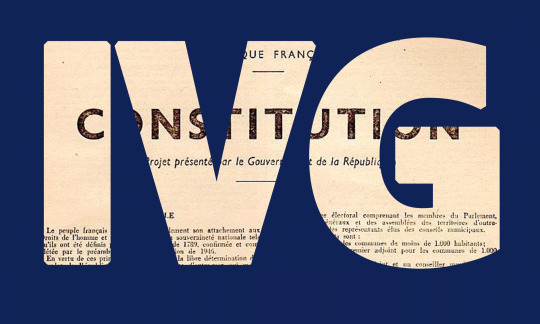
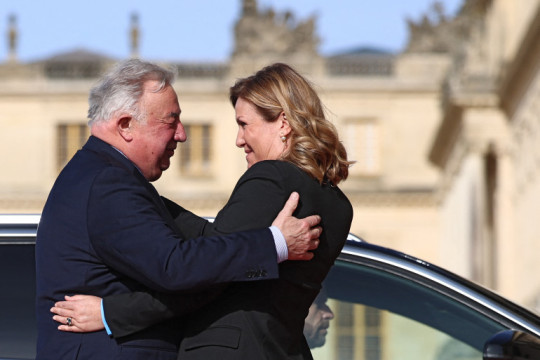


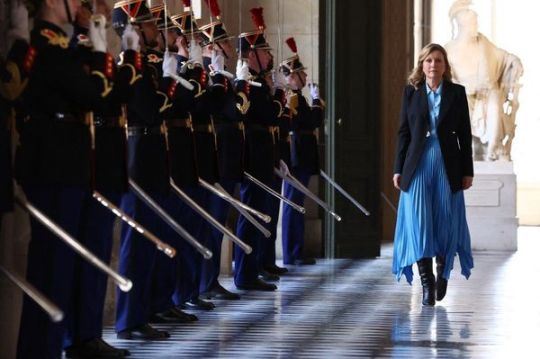

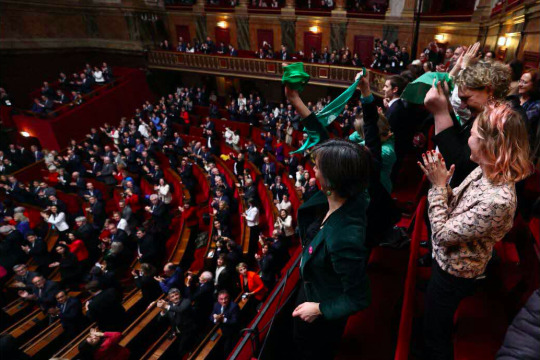


Le droit à l'IVG pour les Femmes rentre définitivement dans la Constitution Française ^^)
Grâce à la Loi Constitutionnelle scellée ce 8 mars 2024, Place Vendôme à Paris - votée en début de semaine à une TRES grosse majorité par les deux Chambres représentant le peuple français, l'Assemblée Nationale, d'une part, menée par une femme Yaël Braun-Pivet et par le Sénat, d'autre part, mené par un homme Gérard Larcher, rassemblés en Congrès exceptionnel tenu à Versailles le 4 mars dernier, la ville des Rois, et qui comporte un article unique, modifiant l'article 34 de la Constitution Française pour y inscrire : "La loi détermine les conditions dans lesquelles s'exerce la liberté garantie à la femme d'avoir recours à une interruption volontaire de grossesse".
Merci pour toutes celles qui en ont eu besoin au cours de leur vie... et à celles qui en auront besoin...
2 notes
·
View notes
Text

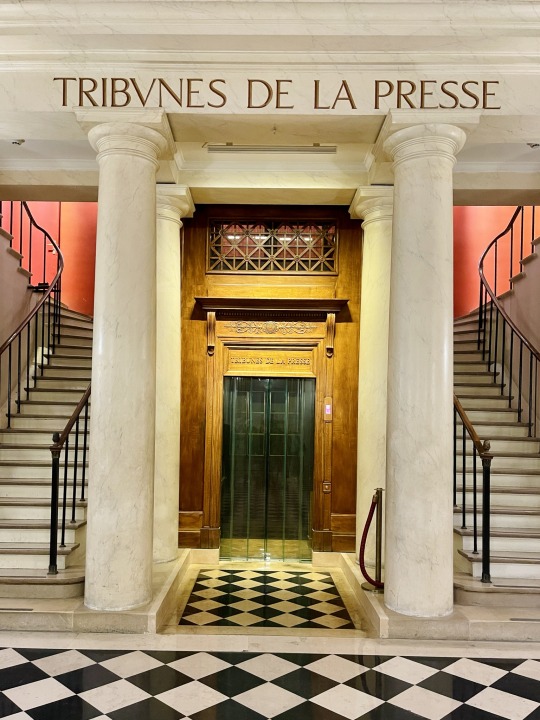
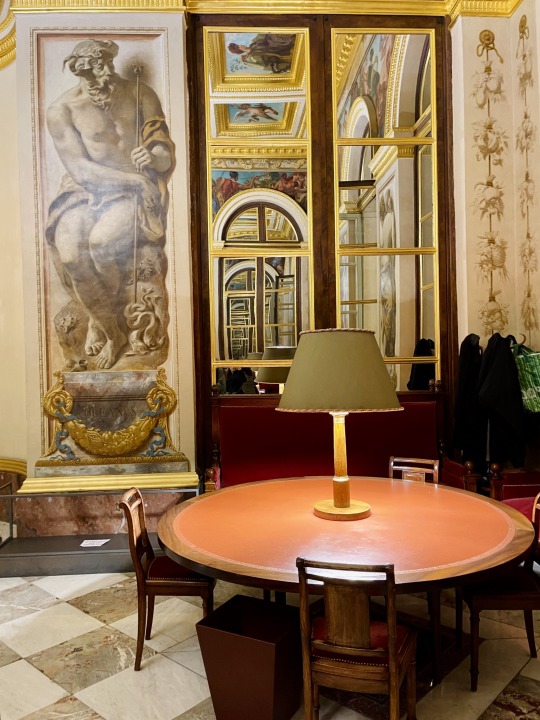

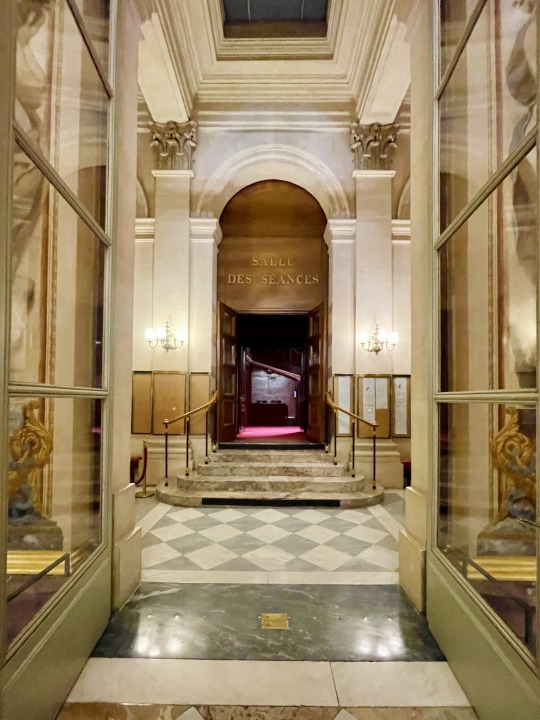



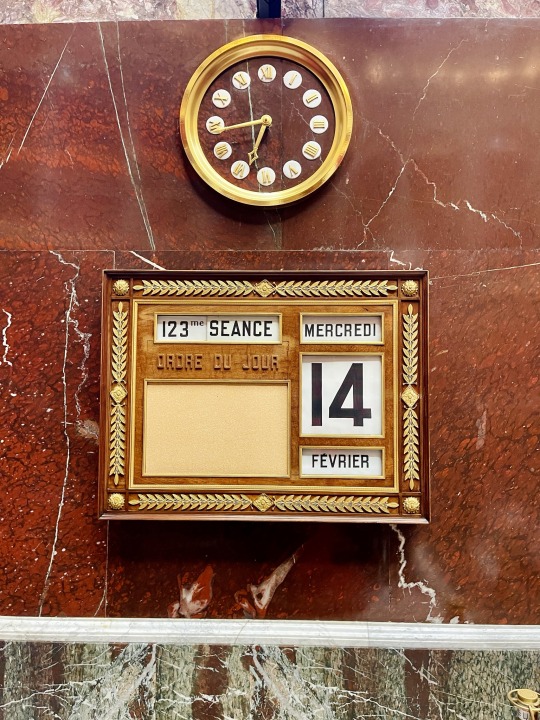

.
Wednesday Wanderings and Wonderings - Palais Bourbon & l’Assemblée Nationale
While I walk by the palais Bourbon quite regularly, it’s in the other side of the Seine from Place Concorde, I finally decided to book a tour (it’s free). You can also assist to a seance since they are open to the public (you just need to register)
PS: The Bibliothèque (library) was under refurbishment so I’ll have to go back… from the pictures I saw it is stunning.
And if you want to read more about l’Assemblée Nationale… here you go:
The National Assembly is the lower house of the French Parliament, the upper house being the Senate (Sénat). The National Assembly's legislators are known as députés meaning "delegate" or "envoy" in English.
There are 577 députés, each elected by a single-member constituency (at least one per department) through a two-round system; thus, 289 seats are required for a majority. The president of the National Assembly, currently Yaël Braun-Pivet (Side note: she’s the first woman as president and out of her 6 vice-presidents 5 are women yeah!!), presides over the body. The officeholder is usually a member of the largest party represented, assisted by vice presidents from across the represented political spectrum. The National Assembly's term is five years; however, the President of France may dissolve the Assembly, thereby calling for early elections, unless it has been dissolved in the preceding twelve months. This measure has become rarer since the 2000 French constitutional referendum reduced the presidential term from seven to five years. Due to the separation of powers, the President of the Republic may not take part in parliamentary debates.
Following a tradition started by the first National Assembly during the French Revolution, the left-wing parties sit to the left as seen from the president's seat and the right-wing parties to the right; the seating arrangement thus directly indicates the left–right political spectrum as represented in the Assembly. Like most institutions of importance in Paris, it is guarded by Republican Guards.
Since 1988, the 577 deputies are elected by direct universal suffrage for a five-year mandate. The constituencies each have about 100,000 inhabitants. The deputy for the most populous (within Val-d'Oise), represented 188,000 voters, while that for the other extreme (for Lozère at-large), represented 34,000. That for Saint Pierre and Miquelon serves fewer than 6,000. Most were redrawn in 2009 and the creation of eleven constituencies for French residents overseas
Of the 577 elected deputies, 539 represent metropolitan France, 27 represent the overseas departments and overseas collectivities; 11 represent French residents overseas. => Jeremy and I voted in Singapore a couple months before we left.
2 notes
·
View notes